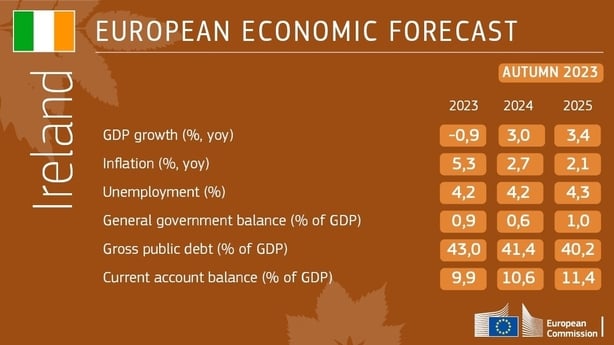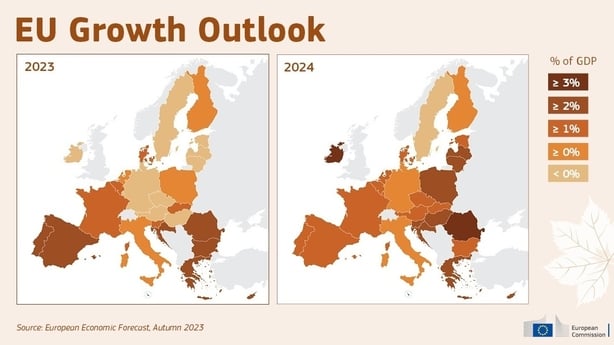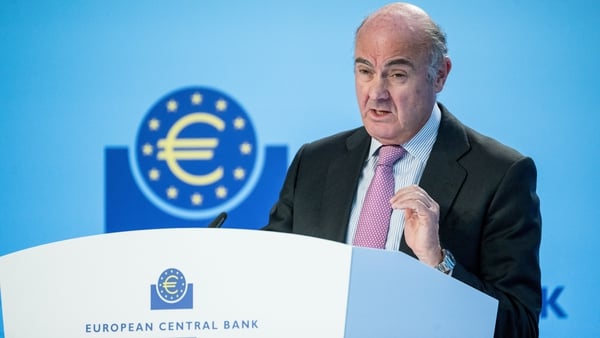The European Commission has sharply revised downwards its forecasts for growth in the Irish economy measured by Gross Domestic Product (GDP), mostly due to falls in exports by multinational companies.
However, it has slightly increased its forecasts for growth in the domestic economy, as measured by Modified Domestic Demand (MDD).
In its Autumn Forecast, published today, the Commission predicts the economy measured by GDP will shrink by 0.9% this year before recovering to grow by 3% next year and 3.4% in 2025.
In its Spring Forecast earlier this year, the Commission had forecast that GDP would increase by 5.5% this year.
The downward revision is attributed to "a few sectors dominated by mostly export-oriented multinationals".
The Commission says growth in the pharmaceutical sector has slowed "after the pandemic-linked boom".
It also notes exports of semiconductors and contract manufacturing have slowed. This includes goods like Apple iPhones which are made abroad but attributed under statistical rules as "Irish" exports.
September goods exports and imports figures also published today by the CSO confirm the continuation of this trend.
However, the Commission says that by contrast the ICT sector - which accounts for over half of Ireland's services exports - is still seeing "robust growth".
It says recent investments should see a return to growth in these sectors in the coming years, although it expects that pace of growth to be "less dynamic" than in recent years.
It predicts the domestic economy will grow by 2.3% this year and 2.2% next year. This more moderate pace of growth is down to inflation curbing spending by households and businesses.
Ireland's economy grew in GDP terms by 9.4% in 2022, while MDD grew by 9.5%.

The European Commission also said today that the euro zone economy will grow more slowly this year than previously expected, but will avoid a technical recession and growth will rebound next year.
The EU executive arm cut the growth forecast for the 20 countries sharing the euro for 2023 to 0.6% from the 0.8% expected in September because high inflation, rising interest rates and weak external demand took a heavier toll than expected.
But growth will already start to pick up in the last three months of this year with GDP up by 0.2% quarter-on-quarter after a 0.1% contraction in the July-September period and overall in 2024 growth is likely to be 1.2%, accelerating to 1.6% in 2025, it added.
"Economic activity is expected to gradually pick up as consumption recovers on the back of a steadily robust labour market, sustained wage growth and continued easing of inflation," the Commission said.
"Despite tighter monetary policy, investment is projected to continue increasing, supported by overall solid corporate balance sheets and by the Recovery and Resilience Facility," the Commission said.
Inflation, which the European Central Bank wants to keep at 2% over the medium term, is to ease to 3.2% next year from 5.6% expected in 2023 and slow further to 2.2% in 2025.
The aggregated euro zone budget deficit is to shrink to 2.8% of GDP in 2024 from 3.2% seen this year and ease further to 2.7% in 2025, below the EU ceiling of 3% of GDP.

"The main driver of this decline is set to be the sizeable reduction in energy-related measures next year and their phase out in 2025," the Commission said.
But France, Italy, Slovakia, Malta and Belgium will have budget deficits well above 4% of GDP both next year and in 2025 the Commission forecast, which is likely to trigger EU disciplinary steps against these countries.
Aggregated euro zone public debt will ease, the Commission forecast, declining to 89.7% of GDP in 2024 from 90.4% expected this year and edging further down to 89.5% in 2025.
"This is supported by high inflation, while higher interest rates on new debt issuance raise interest expenditure only gradually given the long average maturity of public debts in the EU," the Commission said.
Additional reporting Reuters






